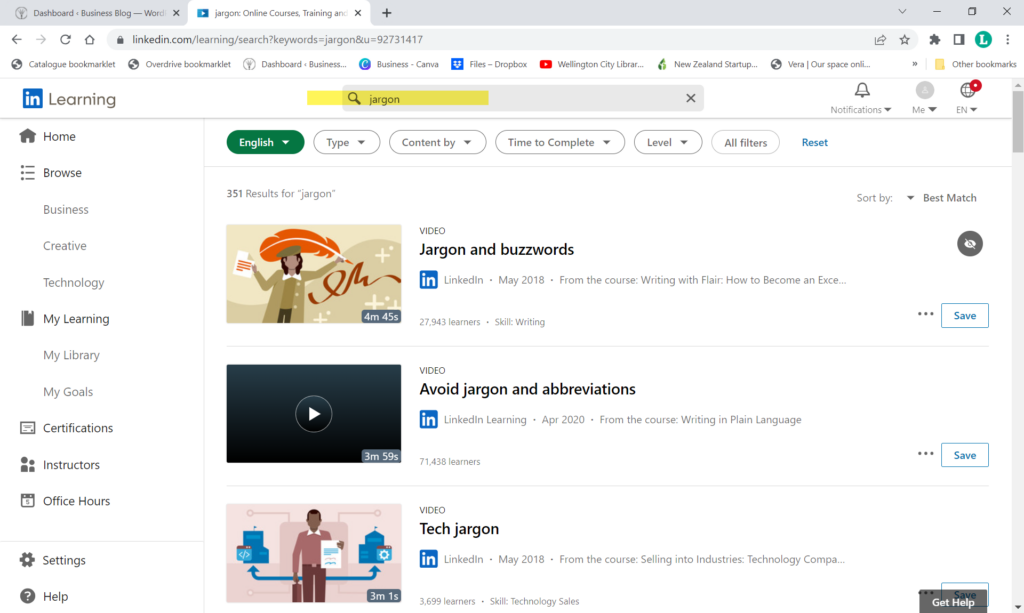“What’s our North Star?”
“I’ll socialise it with the team”
“Grip it up”
Do any of these phrases sound familiar?
Perhaps you are guilty of using them?
Do they make you want to do this when you hear them?
A quick ask around as to the most disliked corporate speak people encounter in their workplaces revealed the above examples are all alive and well and being used regularly in Wellington workplaces.
They are vague, ambiguous and serve to confuse, irritate, or even alienate people, with one worker I spoke to, saying “After years of hearing ‘management speak’ I seem to go into automatic switch-off mode as soon as anyone above my level starts to talk…”
Not the desired effect for a manager wishing to appear on trend by dropping some newly acquired buzzwords into the meeting!
A recently released report surveyed workers in eight countries about terms and phrases used in their workplaces that they disliked and understood least.
The results differed between countries and cultures with Asian and Latin American countries finding acronyms like EOD (End of Day) and KPI (Key Performance Indicator) amongst the most confusing business speak whereas English speaking nations found it hard to understand expressions such as “Ducks in a row” or “Herding cats”.
Aotearoa was not part of the survey although our trans-Tasman neighbour contributed a colourful list of confounding business speak with the top five being :
1. Boiling the ocean
2. Noodling
3. Low-hanging fruit
4. Juice worth the squeeze
5. Wheelhouse
Whatever you call it – jargon – or management/corporate/business speak – in the workplace makes communication difficult for many people, and is even more confusing for those for whom English is not their first language.
When it comes to acronyms this becomes more complicated when the same, or similar, acronyms have quite different meanings in different contexts.
What is workplace jargon? This definition sums it up :
Corporate jargon is essentially workplace language, and is used to describe a set of words, phrases, or acronyms used in a business or corporate setup. These can be difficult to understand for people new to the environment… Jargon is deeply rooted in the corporate culture. These words or phrases or acronyms stay in use for such a long time that they become part of the vocabulary.
However, by becoming part of the workplace vocabulary these words and phrases are often never translated for new hires, leading to confusion and a possible feeling of isolation.
While some jargon is unique to a workplace or industry and used to convey ideas particular to that environment there are those in workplaces who adopt jargon in order to sound more knowledgeable or appear “in the know”. But as Lisa notes ….
As the survey results show, the use (and overuse) of management speak serves to confuse and complicate workplace communication in turn potentially hindering productivity.
Jargon can be used verbally in meetings or in written communication (emails). It can also be used excessively in other forms of communication such as in reports or on websites and, as a way of addressing this, the Plain Language Act came into being in 2022.
The Act’s purpose, while aimed at Government agencies, sets a standard all workplaces can follow :
The purpose of this Act is to improve the effectiveness and accountability of public service agencies and Crown agents, and to improve the accessibility of certain documents that they make available to the public, by providing for those documents to use language that is—
(a) appropriate to the intended audience; and
(b) clear, concise, and well organised.
Workplaces operate more effectively when communication is clear, so to help we’ve pulled together some resources to help you cut through the jargon and choose words more intentionally instead of peppering conversation with an alphabet soup of buzzwords and phrases.
To start here’s a couple of listings to help identify and demystify some commonly used office speak terms:
45 Examples of Business Jargon Terms and Phrases
Top 50 Corporate Jargon to Help You Survive High-Level Meetings
This article give some examples of what to say instead of the obfuscating terms.
Linkedin Learning has short videos on jargon as part of lengthier courses on writing in plain English.
Login using your library registration card and password and type “Jargon” into the search box.

Lost in translation: The joy of a jargon-free world
TED talk
When was the last time you optimized something? Perhaps you’ve been engaging proactively? Are you strategically evolving a market in real-time? Any idea what any of that means? Thea Knight is on a crusade to kill the jargon that is strangling our conversations. She explains how we can be more “intentional” about our words – so we can start to actually say things again.
Does Your Office Have a Jargon Problem?
Zachariah C. Brown, Eric M. Anicich, and Adam D. Galinsky
March 19, 2021, Harvard Business Review online
While most people find jargon (not to be confused with slang) to be annoying, it remains a staple of the modern workplace. It does have its uses — for example, air traffic controllers use the phonetic alphabet for clarity and accuracy. But, according to the authors’ research, jargon can also result from insecurity and a desire for professional status. If you’re concerned about the potential negative effects of jargon on you or your organization, there are four steps you can take to mitigate them. First, be aware of context to know whether jargon might be helping or hurting you. Second, ask yourself if there’s a simpler way to communicate the same idea or if the audience commonly uses the same jargon. Third, use executive communications that use clear and unambiguous language to set the tone for the organization. Finally, send a message by letting others know why you or your organization don’t espouse excessive jargon.
“A hilarious compendium, for fans of The Office and Eats, Shoots and Leaves, that rails against something that drives us all utterly mad: office jargon.” (Catalogue)
“Written in concise, accessible sections, this good-humoured book explains clearly the essentials of writing good, plain English. Corder takes readers through the entire writing process – from initial idea, through planning, writing, revising and proofreading to the eventual presentation of a piece of writing. At the end of the book, there is also an easy guide to basic grammar and punctuation as well as self-test exercises.” (Catalogue)
Available as EBook Libby
The plain English approach to business writing / Bailey, Edward P
“Entertaining and down-to-earth, The Plain English Approach to Business Writing shows busy professionals of all backgrounds–corporate, government, financial, legal–how to write clearly and effectively. It can be read in an hour, and used for the rest of one’s life.” (Catalogue)
How to use power phrases to say what you mean, mean what you say, and get what you want / Runion, Meryl
“Easy-to-master techniques for more effective communications in all areas of life In this breakthrough guide, communication guru Meryl Runion explains why effective communication is more than just a business tool. It is also the key to happier, healthier relationships, and greater personal fulfillment and business success. In How to Use Power Phrases to Say What You Mean, Mean What You Say, & Get What You Want she introduces readers to the concept of power phrases–short, focused expressions that let people be direct and to the point without seeming brusque or nasty. In clear, down-to-earth language, illustrated with numerous vignettes and real-world examples, Runion teaches readers how to: Say what needs to be said without fear of misinterpretation or creating negative emotional responses Master six basic methods for crafting power phrases for any setting and every social, professional, or interpersonal situation” (Catalogue)
It’s the way you say it : becoming articulate, well-spoken and clear / Fleming, Carol A
“The best, most direct way to convey your intelligence, expertise, professionalism, and personality to other people is through talking to them. But most people have no idea what they sound like. And even if they do, they don’t think they can change it. It’s the Way You Say It is a thorough, nuts-and-bolts guide to becoming aware and taking control of how you communicate with others.” (Catalogue)
Crystal clear communication : skills for understanding and being understood / Cole, Kris
“Management consultant Kris Cole outlines the importance of good communication and gives easy tips on how to understand and take charge of your new communications to become successful in everyday life. This new edition includes a new chapter on email communication and the impact that this technology has had on everyday communication.” (Catalogue)
Business communication : deliver your message with clarity and efficiency / LoCicero, Joe
“When mastered effectively, the art of business communication can build a lucrative, impressive, and respected company beyond imagination. A company that embraces solid communication saves and makes time and money–the two hottest commodities in the business world. In Streetwise Business Communications, communications expert Joe LoCicero answers your questions about communicating with clients and staff, dealing with technology and choosing the right medium. Streetwise Business Communications is the complete reference for all small business owners who struggle to come up with a clear and concise message, and the means with which to communicate that message. You too can communicate a message, retain, and win new business–even compete with the big boys. All you need is the proper the tools to speak, write, organize, and present their message effectively. Streetwise Business Communications will arm you with those tools!Includes crucial advice on: Good grammar and correct spellings of commonly misspelled words Proper phone and email etiquette Well-organized letters, memos, and e-mails Presentation skills In all its formats, communication must constantly, continually, and cleverly work to get–and keep–business. No matter the size of your business, Streetwise Business Communications will keep you and your company in contact, in command, and in control! ” (Adapted from Catalogue)
If you would like more information please contact the Prosearch team at the library. We can help you find information across a range of perspectives and resources. All enquiries are treated in confidence.





